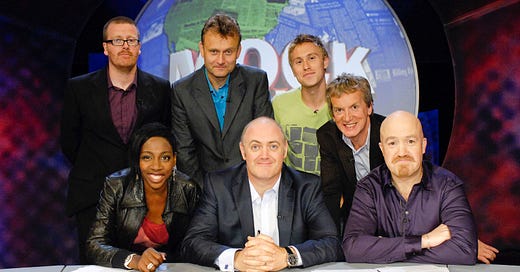There is nothing worse than a media figure - even a marginal one - poaching the work of smart people without their platforms, so let me acknowledge, before I begin, that the “cockwomble” concept is not of my own making. JD, Kunley Drupka and Jossarian, among others, have made vital contributions to the emerging field of Wombology. This is a humble attempt to draw together multiple insights on Homo womble, all of which could be disputed.
Essentially, “cockwomble” is a generational phenomenon. It denotes psychological and socio-cultural traits that can exist outside of men born between 1970 and 1995 but which were largely formed by that period. As a child of 1991, I bear certain womblish traits myself, though I do best to restrain them.
“Cockwomble” itself is a term that sprang from a hideous trend of sub-Wodehousian creative swearing, which caught on among people who wanted to be Stephen Fry and were desperate to make a name for themselves on the youthful platforms of social media. It encapsulates two trends that define “cockwomble”: an enthusiasm for Douglas Adamsesque absurdism in the face of a silent universe and a half-repressed rage that bubbles underneath the surface.
This rage is real – or, at least, it is partly real. It emerges from material conditions. Unlike their predecessors, the Britpoppers, the cockwomble generation faced soaring housing prices and, for most of them, the establishment of tuition fees - but also, and perhaps more importantly, the disappointment that came from entering adulthood amid a vast surplus of artistically and academically aspiring young people and an increasingly competitive sexual marketplace. Put bluntly, the Britpopper is far more liable to be rich and married, or at least divorced with kids, than his cockwomble son. A Britpopper, indeed, is liable to be the landlord to a disaffected member of Generation Womble.
The political climate played a part as well. Britpoppers had spent the 90s scoffing about “Tory sleaze” and “New Labour spin”, and like to see British politics as an infuriating but nonetheless enjoyable “wacky rigmarole”. The cockwomble generation came of age, for the most part, amid the War on Terror and the financial crash, understandably darkening their perception of the world.
But it is also performative. The cockwomble kind, as Jossarian notes, want to be comedians and activists at the same time. They are enamoured of “rants”: conflating the absurdist filth of Derek & Clive with the noble outrage of Howard Beale in Network to produce the high-strung monologues of Jonathan Pie, the brow-furrowed opinionating of James O’Brien and the seminal text 52 Times Britain Was A Bellend by that cleric of cockwomble doctrine James Felton.
They aspire to be clowns and prophets, veering inelegantly between random pop culture references and high moral dudgeon, such as in a passage of Mr Felton’s masterpiece where he stops ranting about the opium wars to make a bizarre joke about Friends. This conflict helps to ensure that the products of the cockwomble phenomenon are rarely especially funny or especially insightful.
The child of the womble was probably a huge fan of Quite Interesting in their younger days and developed a sense that intellectualism lay in one’s expansive knowledge of curious facts. Thus, their knowledge tends to be broad yet shallow – a parade of historical and cultural titbits marching over such modish paradigms as new atheism and fucking loving science.
At their most annoying, they treat well-known facts - or outright fabricated ones such as “Churchill gassing the Kurds” - as if they are deep, esoteric knowledge hidden from the masses. Think Otto English, author of Fake History, pointing out for the 10,000,000th time that fish and chips did not actually originate in England.
A note on style: the cockwomblrista may well have a guilty conscience about the sort of jokes they used to make and enjoy. Their youth, in all likelihood, was spent laughing at edgelords from Derek & Clive to Frankie Boyle, and scouring the dark corners of Sickipedia. Morbid humour was a means of shocking their already less than traditional parents, and establishing a kind of pseudo-masculinity. Times have changed. You can’t punch down. Being hyper-woke is in part a means of atoning for their indiscretions. One can see this vividly in the career of Mr Boyle or the Australian stand-up comedian Jim Jefferies.
Above all, the defining feature of the cockwomble phenomenon is impotence. Again, one sees it in the very word, which is unable to express pure amusement or pure hatred. But it is also that impotence that emerges from a stew of metaphysical nihilism and political idealism, and from the blending of youthful aspirations into adult realities. This is a cause for sympathy – and, for many of us, empathy. But it still a sad state of affairs.






Excellent field guide. As a 1981 vintage myself, I felt a strong sense of recognition, unfortunately not *just* directed at my peers. “Ask not for whom the cock wombles...”
“new atheism and fucking loving science” laughed out loud when I read this.